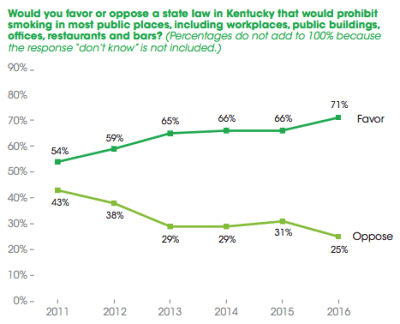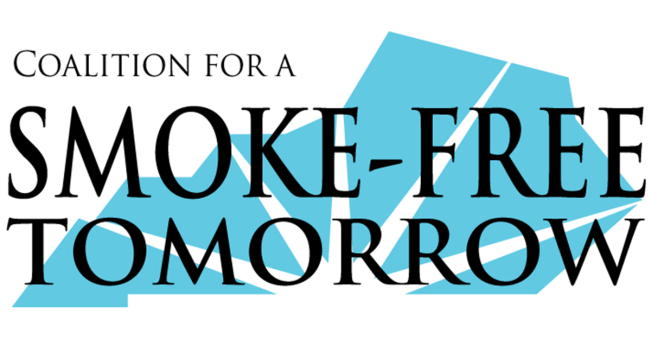As Kentucky continues to lead the nation in cancer mortality, a group of health and business advocates plan to announce the creation of an anti-smoking coalition whose goals include raising the cigarette tax by at least $1 per pack.
The Coalition for a Smoke-Free Tomorrow will be introduced tomorrow in Frankfort by groups including Baptist Health, the Kentucky Chamber of Commerce and the Foundation for a Health Kentucky.

“We have a smoking crisis,” said Ben Chandler, president and CEO of the Foundation for a Healthy Kentucky.
The broad anti-smoking coalition, which also includes Passport Health, the James Graham Brown Cancer Center, the Louisville Urban League and the Louisville Metro Department of Public Health and Wellness, is a reflection of the “extent of the problem that we face here in Kentucky,” Chandler said.
Kentucky has the highest share of adults who smoke, according to the Centers for Disease Control and Prevention. It also has the highest share of people with cancer and among the highest share of people who die from cardiovascular disease, according to the American Heart Association. In 2015, 25.9 percent of Kentucky adults smoked, according to the CDC. The national average was 15.1 percent.
Nearly 9,000 Kentuckians die from smoking-related illnesses each year, and the state spends about $2 billion annually on smoking-related health care.
About 511 Kentuckians per 100,000 population have cancer, which is the highest in the nation. Jefferson County’s rate was even higher than the state average, at 524 per 100,000.
Earlier death, lower quality of life

Dr. Patrick Withrow, director of public outreach for Baptist Health Paducah, told Insider that the state’s high smoking rates increase Kentuckians’ risk for cancer and cardiovascular diseases and other health problems, shortens their life spans and decreases their quality of life.
As researchers have told Insider, smoking does not just increase a smoker’s risk for cancer, but is particularly damaging to cardiovascular health because it increases plaque buildup in blood vessels, which can lead to serious health conditions including heart attacks.
Withrow, a cardiologist, said that beyond a greater risk of early death, he has seen in his long career many patients whose smoking-related diseases have decreased their quality of life. People with heart disease or damaged heart muscles from heart attacks often cannot exert themselves without great discomfort, which often means they stay in their homes and cannot participate in activities with friends and family. In addition, he said, they may have to undergo invasive medical procedures — heart and lung operations.
And, Withrow said, a lot of such patients suffer from guilt and depression because despite their health problems, they cannot quit smoking.
Withrow also said nicotine is highly addictive, which means that one of the best ways to address Kentucky’s smoking crisis is to prevent people from ever starting to use tobacco products. Smokers often begin when they’re young, he said, and adolescent brains are particularly susceptible to nicotine addiction.
“If we can prevent the adolescent from ever beginning, we’re way ahead of the game,” he said.
Tax hike, smoking bans

Courtesy of the Foundation for a Healthy Kentucky
Withrow and Chandler said that research from other states had shown that raising the cigarette tax and banning smoking in public buildings helped curb smoking rates. According to the Tax Foundation, Kentucky has among the lowest state taxes on tobacco products.
Chandler said that public support, the broad coalition and the pension crisis made this an auspicious time to push through a state cigarette tax hike.
“Revenue is needed in the commonwealth,” he said, and a $1 per pack increase would generate about $246 million per year and cut health care costs because some people would quit, while others wouldn’t even start.
The state chamber supports the effort because it realizes that the state’s unhealthy workforce harms the state’s economy, Chandler said.
Some businesses stay away from Kentucky because of employees’ health problems, and businesses that are here incur greater costs than competitors in healthy states, because Kentuckians are more likely to stay away from work for health reasons, and they incur greater health care costs.
The CDC says that tobacco prevention and control activities are a public health “best buy” because every dollar states spend on tobacco prevention allows them to cut tobacco-related health care expenses and hospitalizations by up to $55.
Chandler also said that while the state legislature and Gov. Matt Bevin had signaled that they were not interested in passing a law that banned smoking in public buildings statewide, counties and cities had passed local smoking bans.
About 30 percent of the state’s population is covered by such bans, Chandler said, and the coalition will try to persuade other cities and counties to adopt similar legislation.
“We’re going to continue this effort until we get the job done,” he said.
The Tobacco Growers Cooperative Association, which represents tobacco farmers in Kentucky, Ohio, Indiana, Missouri and West Virginia, could not be reached Tuesday.
Source: New coalition to tackle Kentucky’s ‘smoking crisis’ – Insider Louisville






